Transport Modernizing El Salvador’s Transport Infrastructure in 2025

El Salvador’s transport and logistics sector is rapidly evolving, driven by infrastructure development and strategic investments aimed at enhancing its role in regional and global trade.
Image credit: Elena Berd / Shutterstock.com
The country’s extensive road network, which spans over 10,000km, including approximately 4,033km of paved roads, plays a crucial role in facilitating the movement of goods and people.
Key projects, such as the expansion of the RN-21 freeway and the Los Chorros upgrade, are designed to address congestion and frequent landslides on one of the nation’s busiest highways. These improvements will significantly enhance connectivity between the western region and the capital, boosting trade and mobility.
In the maritime sector, the ports of Acajutla and La Unión are central to the country’s trade operations. Acajutla, a vital hub for exports and imports, handles substantial cargo volumes and is set to benefit from a USD1.62 billion investment by Turkish firm Yılport to triple its capacity.
This project also includes revitalizing La Unión port, positioning it as a strategic gateway for Central American trade. The upgrades are expected to make El Salvador a regional logistics leader, strengthening its competitiveness in global shipping.
Luis Cantó, general manager of Union Portuaria del Pacífico (a venture between Yılport and the Salvadoran government), stated that “within three years, we expect a five to eight-fold increase in container throughput, with potential for further growth. This approach ensures readiness for larger next-generation vessels, positioning the port as a key global player.”
Air transport continues to be a crucial component of the logistics network. El Salvador International Airport remains the primary hub for both passenger and cargo transport. Meanwhile, plans for a new airport in the Pacific region aim to decentralize economic activity and promote development in the eastern part of the country, creating new opportunities for trade and investment.
Free trade zones play a vital role in local logistics infrastructure. Strategically located near key transport hubs, these zones attract foreign investment and support manufacturing and export activities. The continued development of these zones aims to improve the country’s appeal to multinational companies and integrate it further into global supply chains.
With the growth of e-commerce, logistics companies in El Salvador are expanding warehousing capacity and adopting advanced technologies to streamline delivery processes.
Despite challenges, including logistical inefficiencies reflected in the country’s 2023 Logistics Performance Index score of 2.7, efforts to modernize infrastructure and optimize operations are helping to overcome these obstacles.
El Salvador’s infrastructure focus underscores its commitment to strengthening its logistics sector. These developments position the country as a more competitive player in international trade, laying the foundation for sustainable economic growth.




